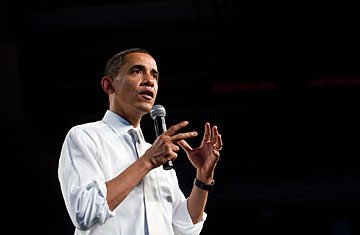
U.S. President Barack Obama addresses a town-hall meeting on health care at Shaker Heights High School in Shaker Heights, Ohio, outside Cleveland
(3 of 3)
4. Personal Touch
From the beginning, President Obama has taken almost the exact opposite route than that taken by President Bill Clinton in 1993. The Clinton health-care plan was written in secret, without input from Congress, before the Administration tried to ram it down the throat of the legislative branch. The catastrophic failure of that strategy is still burned into the minds of many former Clinton staffers, including Obama's chief of staff, Rahm Emanuel.
Obama, by contrast, has given Congress a free hand to draw up legislation as Democratic leaders like Nancy Pelosi see fit, with limited input from the White House. But Obama's decision to leave the details up to Congress while providing just the broad principles he wants to see in the finished product has, by most accounts, gone too far to the other extreme. Congress can't function without some guidance and political cover from the White House, and the past few weeks have heard much grumbling from Democratic staffers on the Hill that nothing will get done unless the White House gets more intimately involved.
The President tried to breathe some life into the process with his prime-time news conference last week, but he remained quite vague, and his response to a question about the disorderly conduct arrest of Harvard scholar Henry Louis Gates ended up dominating the news coverage. Still, the White House now seems to realize that a series of press conferences or political speeches across the country, or even an historic address to a joint session of Congress (as Clinton tried), will not be enough to get over the finish line. Health-care reform is so politically fraught that it needs a strong White House presence in the room, something that happened only late last week in the House (when Emanuel became personally involved in the talks with the Blue Dogs) but has yet to start with the Senate.
5. Public Perception
The double blow of both the House and Senate being unlikely to pass legislation before his deadline is the worst setback Obama has seen in his six months in office. The monthlong break will give critics ample time to hone their messages of "too much, too soon" and stir up grass-roots opposition, and members of Congress will go home to hear what constituents have to say. As President Lyndon Johnson, the great master of the Senate, warned his staff after his 1964 landslide, "every day while I'm in office, I'm gonna lose votes." Some 56% of Americans believe that Obama can implement a national health plan in the next four years, but that's down from 63% six months ago, and the percentage of doubters has risen from 31% to 39% in that same period, according to a July 22 Associated Press poll. Simply missing the deadline adds to the perception that health-care reform may be stillborn.
To counteract any loss in momentum, the political wing of the Obama Administration — Organizing for America — is launching a massive grass-roots campaign throughout the August recess to try to drum up a groundswell of support for health-care reform. It will be the first major test of Obama's campaign apparatus in a noncampaign setting. If the President hopes to get health care done in the fall, he will need the support of all 8 million supporters on his e-mail lists and many, many more. The White House is clearly trying to change the terms of the debate; during the press conference, Obama borrowed an argument from Steven Pearlstein of the Washington Post by warning that the bigger risk lies in not passing health-care reform, since the status quo promises only higher costs and less coverage. Over the weekend, Obama also tried to counter the notion that reform will add costs to small-business employers, a frequent attack of the current plans.
